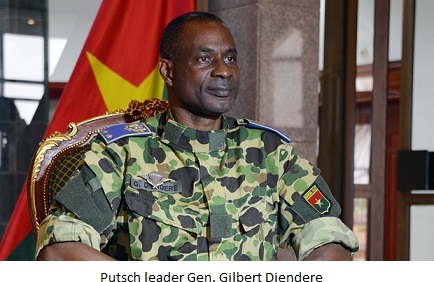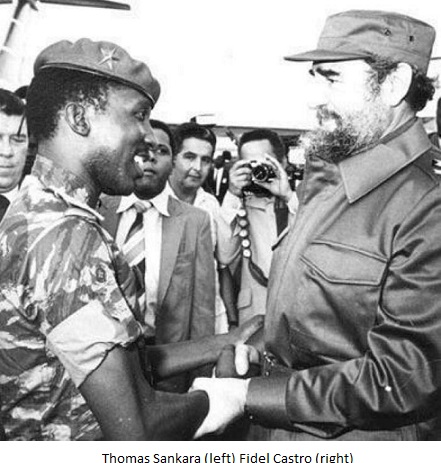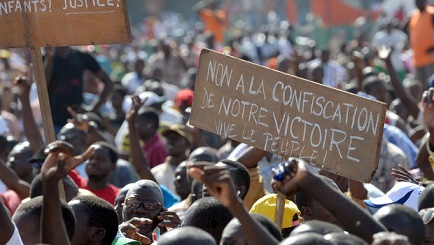The African Union dispatched an international delegation to Ouagadougou yesterday to hold crisis talk with General Gilbert Diendéré who seized power last week in a coup that ousted the interim president Michel Kafando. Senegalese President Macky Sall was also part of the delegation. Putsch leader Gen Diendéré was the chief of staff to former president Blaise Compaoré, who was forced out in a popular uprising last October.Benin President Thomas Boni Yayi, who took part of the delegation, told journalists after meeting coup leader Gen Gilbert Diendere in Ouagadougou that he could see the reinstatement of President Michel Kafando. Yayi suggested an announcement would come today.
The making of a coup
In a communiqué read on national TV and radio last Wednesday night, Lieutenant Colonel Amadou Bamba announced the removal of President Kafando including his Prime Minister Isaac Zida.
As it is always the case, whether in Burkina or in Haiti, a curfew was declared and borders were closed. Heavy gunfire was heard in the main square of the capital, Ouagadougou, on Thursday morning after protesters poured into the streets to denounce the actions of the coup leaders, who are members of the elite presidential guard unit.
The leaders of the elite guard, who had disagreed publicly with the transitional government in recent months, identified themselves as the National Council for Democracy and said they had taken control from a “deviant regime”.
Michel Kafando and his PM Isaac Zida were both reportedly arrested after troops stormed into a cabinet meeting. Interim parliament speaker, Cheriff Sy, urged the masses to immediately rise up to protest against what he called a deliberate attempt by the partisans of the old regime to turn back the clock.
Sy called the detention of the president and prime minister “a serious attack on the republic”. He said: “I call on all patriots to mobilize to defend the motherland. Duty calls upon us because the Burkinabe nation is in danger. We call on the solidarity that active forces, political forces, civil society and the international community have with all the people of Burkina Faso to defeat this operation.”
 The latest unrest came just after a year of relative calm that followed a much-praised popular uprising which swept the old regime of Blaise Compaoré after 27 years in power. Last October, Compaoré, who was determined to prolong his rule, was met with unforeseen popular resistance. Protesters gathered in the streets in large numbers through October 2014 and set the parliamentary building on fire, forcing Compaoré to flee into exile in neighboring Côte d’Ivoire.
The latest unrest came just after a year of relative calm that followed a much-praised popular uprising which swept the old regime of Blaise Compaoré after 27 years in power. Last October, Compaoré, who was determined to prolong his rule, was met with unforeseen popular resistance. Protesters gathered in the streets in large numbers through October 2014 and set the parliamentary building on fire, forcing Compaoré to flee into exile in neighboring Côte d’Ivoire.
But in an echo of the protests which ended Compaoré’s time in office, crowds gathered with whistles and vuvuzelas near the presidential palace on Thursday morning, shouting “Down with the RSP [presidential guard]”. The headquarters of Compaoré’s Congress for Democracy and Progress party was ransacked in the evening.
The coup also received international condemnation. “The United States strongly condemns any attempt to seize power through extra-constitutional means or resolve internal political disagreements using force,” said US State Department spokesman John Kirby.
The UN secretary general, Ban Ki-moon, also expressed dismay after the presidential guard burst into a cabinet meeting. “The secretary general is outraged by reports of the detention of President Michel Kafando and Prime Minister Yacouba Isaac Zida of Burkina Faso,”
In a joint statement, the United Nations, African Union and the Economic Community of West African States (Ecowas) demanded “the immediate and unconditional release of the hostages”.
Thomas Sankara lives on
 If you understand what Che Guevara represents for oppressed masses around the world, you would certainly understand why Burkinabe legendary leader Thomas Sankara was elevated to revolutionary sainthood. Assassinated in 1987, Sankara was beloved beyond the borders of Burkina for his revolutionary romanticism, his works at educating the poor and his undertaking of agrarian reform. In four years in power, he doubled the number of children in schools, reduced infant mortality, redistributed land from feudal landlords to peasants and planted 10 million trees that still help shade Ouagadougou, the capital.
If you understand what Che Guevara represents for oppressed masses around the world, you would certainly understand why Burkinabe legendary leader Thomas Sankara was elevated to revolutionary sainthood. Assassinated in 1987, Sankara was beloved beyond the borders of Burkina for his revolutionary romanticism, his works at educating the poor and his undertaking of agrarian reform. In four years in power, he doubled the number of children in schools, reduced infant mortality, redistributed land from feudal landlords to peasants and planted 10 million trees that still help shade Ouagadougou, the capital.
The exiled president was accused into the death of Sankara, whose body and that of 13 others who died with him were never found. Uncovering the truth into the death of their beloved leader, was the corner stone behind popular unity that lead the drive to oust Blaise Comparoé. Sankara’s widow, Miriam Sankara, plaid a pivotal role in keeping her husband’s name alive and also in keeping the pressure that ultimately overthrew that fascist dictator Comparoé.
Sankara’s widow, Mariam, has fought for DNA tests on Sankara’s body to prove the remains are really his, but has been blocked in the courts. The exhumation was authorized in March. Although the court authorized the investigation, Kafando was reluctant to allow it because of fear it would implicate many people who are now part of the government. Last week, president Kafando finally announced the exhumation of Sankara’s body would go forward “in the name of national reconciliation.” So, the world waits.
Also see: Cote d’Ivoire on the brink of civil war
Like us on Facebook: www.facebook.com/csmsmagazine


